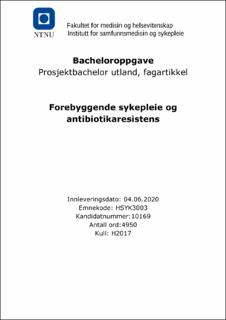| dc.contributor.advisor | Jørgensen, Wanja | |
| dc.contributor.author | Gamborg, Ingrid | |
| dc.date.accessioned | 2020-07-17T16:02:18Z | |
| dc.date.available | 2020-07-17T16:02:18Z | |
| dc.date.issued | 2020 | |
| dc.identifier.uri | https://hdl.handle.net/11250/2669535 | |
| dc.description.abstract | Introduksjon: Antibiotikaresistens er erklært et globalt helseproblem. Infeksjoner bidrar til økt bruk av antibiotika og spredning av resistente bakterier. Ved å forebygge infeksjoner kan sykepleiere begrense resistensutviklingen, og bidra til økt pasientsikkerhet. Artikkelen tar for seg hvordan sykepleiere i Namibia forebygger postoperative sårinfeksjoner. Fokuset i studien er rettet mot sykepleierens kompetanse, og utfordringene som påvirker infeksjonsforebyggingen.
Metode: For å undersøke det overnevnte ble det utført fire kvalitative semistrukturerte intervjuer og flere ustrukturerte observasjoner ved sykehusets relevante kirurgiske avdelinger. Datainnsamlingen ble gjennomført over en tidsperiode på ti uker, og ble bearbeidet, tolket og kategorisert under ulike temaer.
Resultater: Resultatene viser at sykepleierne i studien har god kompetanse om infeksjonsforebygging. Ulike faktorer, som dårlige fasiliteter og lite ressurser, utfordrer kvaliteten og gjennomføringen i sykepleieutøvelsen. Ingen av intervjupersonene var kjent med betegnelsen MRSA eller antibiotikaresistente bakterier.
Konklusjon: Studien har vist at sykepleiere ved kirurgiske avdelinger i Namibia er avhengig av å oppdatere sin kompetanse gjennom hele yrkeslivet for å kunne utføre god infeksjonsforebygging. Ressurstilgangen på sykehuset gir sykepleierne utfordringer i forebyggingen av postoperative sårinfeksjoner. | |
| dc.description.abstract | Introduction: Antibiotic resistance has been declared a global health problem. Infections contribute to the increased use of antibiotics and the spread of resistant bacteria. By preventing infections, nurses can limit resistance and contribute to increased patient safety. The article addresses how nurses in Namibia prevent postoperative wound infections. The focus of the study is the nurse's competence, and the challenges that affect infection prevention.
Method: To investigate the above, four qualitative semi-structured interviews and several unstructured observations were performed at the hospital's relevant surgical departments. The data collection was conducted over a period of ten weeks, and was processed, interpreted and categorized under various topics.
Results: The results show that the nurses in the study has good knowledge about infection prevention. Various factors, such as poor facilities and poor resources, challenge the quality and implementation of nursing practice. None of the interviewees were familiar with the term MRSA or antibiotic-resistant bacteria.
Conclusion:
The study has shown that nurses at surgical departments in Namibia need to update their knowledge throughout their professional life, in order to perform good infection prevention. Limited resource access at the hospital presents nurses with challenges in the prevention of postoperative wound infections. | |
| dc.publisher | NTNU | |
| dc.title | Forebyggende sykepleie og antibiotikaresistens | |
| dc.type | Bachelor thesis | |
